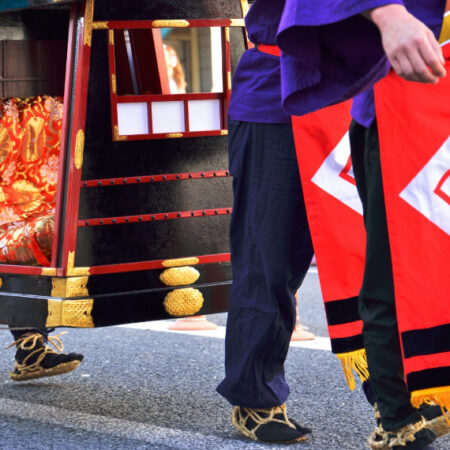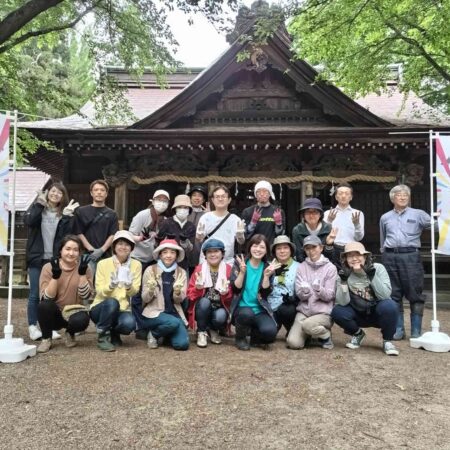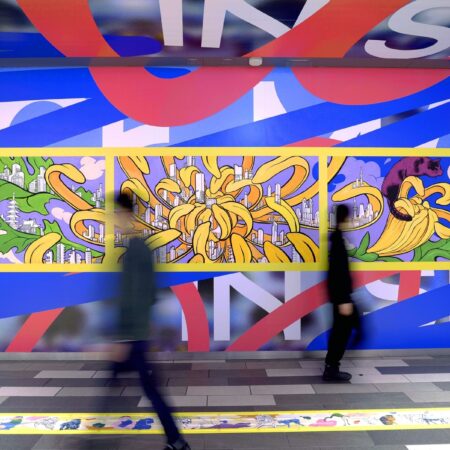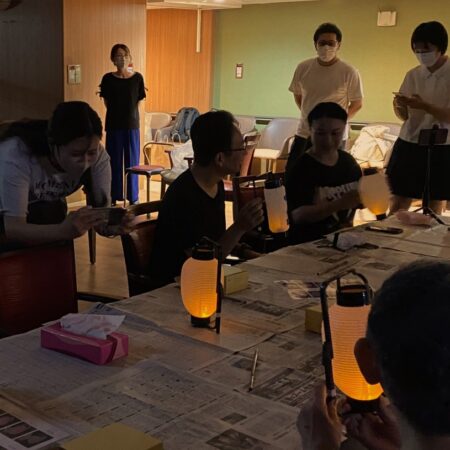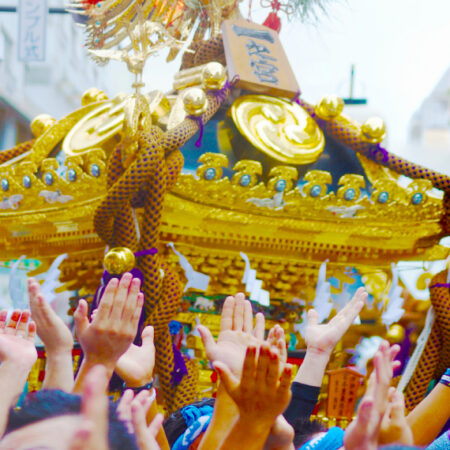縁日って何?お店のお手伝いはできる? What is En-nichi? Can you help with the stalls?

旗やちょうちんがたくさん並んで、屋台がたくさん建つ。
そんな縁日のようすを見て、浴衣を着て行ってみたいと思う人も多いのではないでしょうか?
そこで今回は、縁日はいつどこで行われるのか、日本語と英語で紹介します。
Contents
縁日は仏教の行事 En-nichi is a Buddhist observance
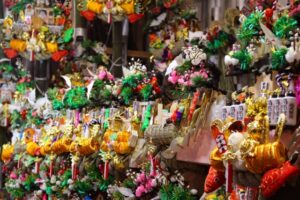
縁日はもともと仏教行事、つまりお寺の行事です。
特定の仏と縁を結ぶ「結縁の日」を略したのが縁日です。
お寺がまつっている本尊に縁がある日付が決められていたり、「亥の日」「酉の市」のように干支から日付が指定されたりしています。
縁日が盛んになったのは江戸時代の17世紀ごろのことです。
縁日には供養祭が行われ、幸運を呼ぶ縁起物がたくさん売り出されました。
そのため、大群衆がお寺に押し寄せました。数万人が殺到したという記録も残っているほどです。
そんな参拝客に向けて商売をするためにたくさんの露天商が集まるようになり、縁日はしだいに宗教色が薄れて庶民の娯楽になりました。
近代以降は、仏教が定めた日以外にも縁日が行われるようになり、町や村が主催したり、商業イベントとして開催されたりしています。
En-nichi is originally a Buddhist observance, which means it is a temple-run event.
En-nichi is an abbreviation for the Day of Kechi-en, where people bond with an enlightened buddhist.
Dates are determined by the Buddha the temple is dedicated to. Some dates are designated according to the Chinese zodiac signs, such as the “Day of the Boar” or “Day of the Rooster.”
En-nichi became popular around the 17th century during the Edo period.
Kuyo Memorial Service was held and many lucky charms were sold back then.
This drew huge crowds to the temple. There were records of tens of thousands of people rushing to a temple.
As many street vendors gathered for business, En-nichi gradually lost its religious intent and was changed to a form of entertainment for the mass.
In recent times, En-nichi is not necessarily a Buddhism-oriented day. Some are sponsored by towns or villages, and some are held as commercial events.
有名な縁日の開催日 Dates for famous En-nichi
お寺が主催する伝統的な縁日が、現在に受け継がれているものもたくさんあります。
全国の有名な縁日には、次のようなものがあります。
There are many traditional En-nichi held on dates oriented by temples, that were inherited to this day.
The date of famous En-nichi held in Japan are the following:
観音菩薩(毎月18日)Kan-non Bosatsu (18th of every month)

浅草寺
浅草寺(東京都台東区)、清水寺(京都府京都市)、長谷寺(神奈川県鎌倉市)などが有名です。
縁結び、厄除け、病気平癒などのご利益があると言われています。
Famous temples: Sensoji Temple (Taito-ku, Tokyo), Kiyomizu Temple (Kyoto City, Kyoto), and Hasedera Temple (Kamakura City, Kanagawa)
They mainly offer blessings for marriage, warding off evil, and recovery from illness.
地蔵菩薩(毎月24日)Jizo Bosatsu (24th of every month)
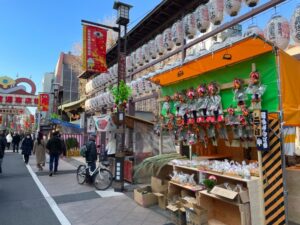
高岩寺「とげぬき地蔵」
高岩寺「とげぬき地蔵」(東京都豊島区)、常光寺「八尾地蔵」(大阪府八尾市)、壬生寺(京都府京都市)などが有名です。
無病息災や、子供を守るご利益があると言われています。
Famous temples: “Togenuki Jizo” of Koganji Temple (Toshima-ku, Tokyo), “Yao Jizo” of Jokoji Temple (Yao City, Osaka), and Mibudera Temple (Kyoto City, Kyoto)
They mainly offer blessings for good health and protection for their children.
弘法大師(毎月21日)Kobo Daishi (21st of every month)

平間寺「川崎大師」
総持寺「西新井大師」(東京都足立区)、平間寺「川崎大師」(神奈川県川崎市)、東寺(京都府京都市)などが有名です。
厄除け、商売繁昌、学業成就などのご利益があると言われています。
Famous temples: “Nishiarai Daishi” of Soji Temple (Adachi-ku, Tokyo), “Kawasaki Daishi” of Heikenji Temple (Kawasaki City, Kanagawa), and Toji Temple (Kyoto City, Kyoto)
They mainly offer blessings for warding off evil, business prosperity, and academic success.
不動明王(毎月28日)Fudo Myo-o (28th of every month)
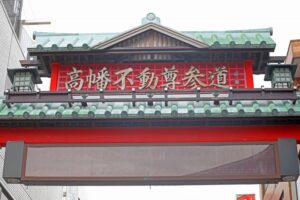
高幡不動尊金剛寺
成田山新勝寺(千葉県成田市)、高幡不動尊金剛寺(東京都日野市)、大山寺「大山不動尊」(神奈川県伊勢原市)などが有名です。
交通安全、厄除け、商売繁昌、家内安全などのご利益があると言われています。
Famous temples: Naritasan Shinshoji Temple (Narita City, Chiba), Takahata Fudoson Kongoji Temple (Hino City, Tokyo), and “Oyama Fudoson” of Oyamadera Temple (Isehara City, Kanagawa)
They mainly offer blessings for traffic safety, warding off evil, business prosperity, and family peace.
薬師如来(毎月8日、12日) Yakushi Nyorai (8th and 12th of every month)

薬師寺
薬師寺(奈良県奈良市)、醍醐寺(京都府京都市)、醫王山高田寺(愛知県北名古屋市)などが有名です。
病気平癒、疫病退散、健康長寿などのご利益があると言われています。
Famous temples: Yakushiji Temple (Nara City, Nara), Daigoji Temple (Kyoto City, Kyoto), and Iouzen Koudenji Temple (Kitanagoya City, Aichi)
They mainly offer blessings for recovery from illnesses, free from epidemics, and life longevity.
鬼子母神(毎月8日、18日、28日)Kishimojin (8th, 18th and 28th of every month)
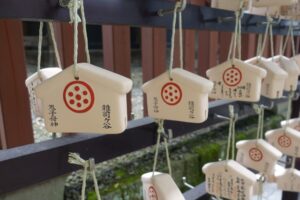
雑司ヶ谷鬼子母神堂
雑司ヶ谷鬼子母神堂(東京都豊島区)、法華経寺「中山鬼子母神」(千葉県市川市)、真成寺(石川県金沢市)などが有名です。
子授けや安産、病気平癒、立身出世などのご利益があると言われています。
Famous temples: Kishimojin-do Hall, Zoshigaya (Toshima-ku, Tokyo), “Nakayama Kishimojin” of Hokkekyoji Temple (Ichikawa City, Chiba), and Shinsho-ji Temple (Kanazawa City, Ishikawa)
They mainly offer blessings for fertility, healthy childbirth, recovery from illnesses, and success in life.
縁日の屋台でお手伝いするには? How can you help out for En-nichi stalls?
屋台を出す飲食店でアルバイト Part-time jobs for restaurants serving street food

縁日には、カラフルなテントを張った露店や、キッチンカーが集まります。
これらのオーナーは、露店や移動販売を専門の稼業とする人たちで、独自の人的ネットワークを持ち、許可証をもらって開業しています。
アルバイトで参加できるチャンスは、ほとんどありません。
一方、お寺の近くにある商店街は門前町と呼ばれ、縁日には多くの飲食店が店の前に屋台を出して、テイクアウト料理やデザート、冷えた飲み物を販売しています。
門前町の飲食店で働いていたり、臨時のアルバイトを探したりすれば、屋台の店先に立つことができるでしょう。
En-nichi attracts stalls with colorful tents and kitchen cars.
The owners run their own business as professionals, with their own human networks and specific permits.
There are few opportunities to work part-time.
On the other hand, a town’s temples are called Monzen-machi, where many restaurants set up stalls down a street to sell food, desserts, and cold drinks on dates for En-nichi.
If you work at a restaurant in a town with a temple or search for a temporary job, you will be able to work with their with food stalls.
ボランティアでイベントを支える Volunteer to support for the events
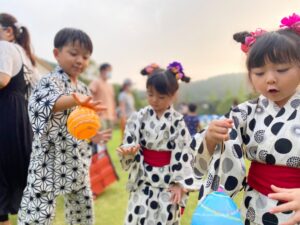
お寺または市町村がボランティアを募集していたら、参加してみましょう。
ボランティアの役割は、受付係など、来場する人々との会話のチャンスが豊富なものが多いです。
非営利の子ども屋台の担当も人気です。輪投げや玉入れ、ヨーヨー釣りなど、伝統的なアトラクションをいっしょに楽しみましょう。
Get involved as volunteers invited by the temple or the local community.
Most volunteers, such as receptionists, have plenty of opportunities to talk with visitors.
Non-profit kid’s playground leaders are also popular. Have fun with traditional attractions, such as ring toss, the Tamaire ball game, and yo-yo fishing.
まとめ 縁日で地域の人とのふれあいを Meet the local people at En-nichi
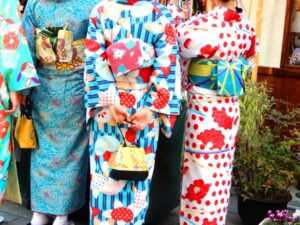
縁日はもともとお寺の行事で、開催日は仏教の伝統に基づいて決められています。
おまいりするとご利益があると言われているので、屋台だけでなくお寺にも行ってみましょう。
現代の縁日には、地元の人たちに喜んでもらえるようにという地域貢献や、観光客に来てもらおうという町おこしの目的も込められています。
近くのお寺の歴史を調べる、門前町でアルバイトをする、受付ボランティアをするなど、さまざまな関わり方で、縁日をもっと楽しみましょう。
En-nichi is originally a temple’s observance, and the date is determined according to Buddhist tradition.
It is said that praying on En-nichi will bring you good fortune, so you should visit the temple and the food stalls.
Modern En-nichi has a purpose of contributing to the community to please the locals, and to revitalize the town to attract tourists.
Get more involved with En-nichi by learning the history of a nearby temple, working part-time at a temple in a town, or volunteering as a receptionist, and so on.


